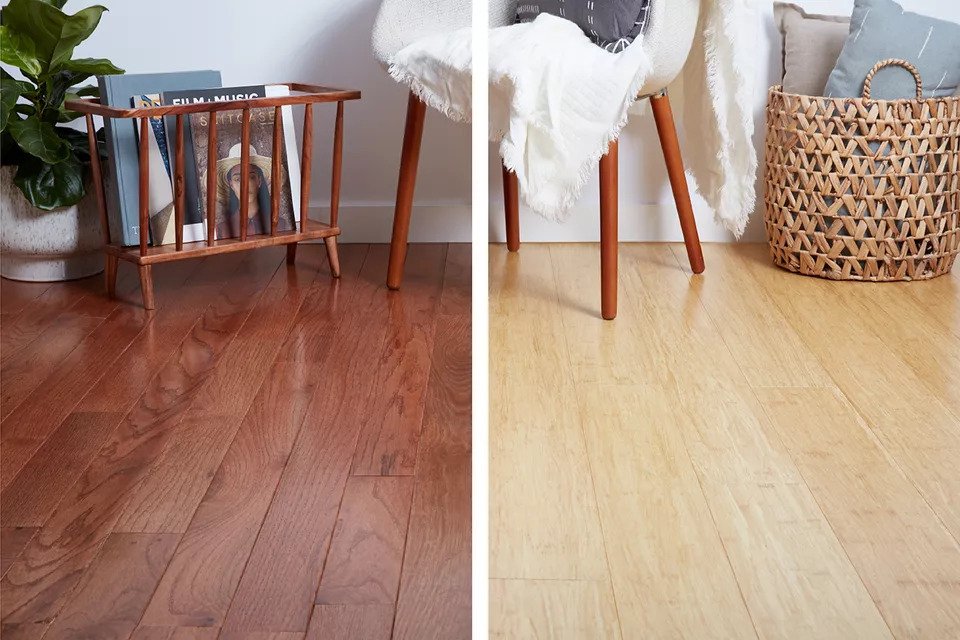
At first glance, bamboo flooring can be mistaken for another form of hardwood flooring. And it is, in fact, often grouped together under the general category of "solid-hardwood" flooring. Bamboo and hardwood do have a similar look and feel, and both materials are available both in 3/4-inch-thick solid planks and in engineered versions in which a finish-quality natural veneer is laminated over man-made core layers. But amid these similarities are some key differences that set these two flooring choices apart.
Bamboo Is Not Wood
Although it is commonly grouped with hardwood flooring, bamboo is not actually a wood, but rather a woody grass. Bamboo, a native plant to tropical regions with heavy rainfalls, grows much faster than hardwood and has a different cellular structure. You might think this makes bamboo flooring impervious to water, but that's not the case. Unsealed bamboo can be discolored and damaged by water, just like hardwood.

Bamboo Is Sometimes Harder Than Hardwood
Just because it carries the label "hardwood," this does not always indicate that a wood species is a very hard material. Technically, the term actually refers to the wood of any tree reproduced from angiosperm seeds—a form of seed that is surrounded by some form of ovum, or fruit. This group includes many popular species, such as oak, maple, cherry, hickory, and walnut, among many others. The other main category of the tree is the softwoods, which grow from gymnosperm seeds—"naked" seeds that are not enclosed within an ovum or fruit. This includes most conifer trees with seed cones in which the seeds are fully exposed.
- Red walnut and Brazilian teak: 2,500 to 3,500
- Hard maple: 1,450
- Red Oak: 1,220
- Cherry: 950
- Poplar: 540
- Aspen: 350
Typically, bamboo in its natural state carries a Janka hardness rating of around 1,300 to 1,400, making it harder than most oak flooring, and comparable to hard maple. However, some bamboo flooring products are carbonized to darken it. This process involves placing the bamboo under extreme heat and pressure, which causes the color to change but also somewhat weakens the material. Carbonized bamboo carries a Janka Hardness rating of around 1,000 to 1,100, which is still considerably harder than some hardwoods.

Hardwood Offers More Diversity in Appearance
With hardwood, you have many species to choose from, and each has its own unique look, feel, and grain patterns. This is compounded by the fact that different cuts also produce different levels of grain consistency. Finally, hardwood flooring also comes in varying grades, which will lead to either good consistency through the lot (high-grade) or a wide range of disparate pieces in the lot. Because of this, hardwood gives you more freedom to choose exactly the look that you want. You can pick through a variety of species and options to find the look that perfectly matches the style of your environment.
Bamboo, on the other hand, has a narrower range of diversity. The most distinctive appearance characteristic of bamboo lies in its construction, of which there are three types:- Vertical-grain bamboo is created with narrow strips of bamboo glued together on-edge, giving the material a striped appearance.
- Flat-grain bamboo is made with thin, flat layers of bamboo glued together, similar to the way plywood is constructed.
- Stranded bamboo is made up of bamboo fibers bound with resin; this has the variegated look of shredded material.

Moisture Damage
Both bamboo and hardwood flooring can be ruined by moisture from standing water or water vapor. Bamboo is commonly touted as being slightly more moisture-resistant and mold-resistant, but the differences are negligible and essentially meaningless. If you fail to properly finish either type of flooring, it will discolor with both moisture and sunlight exposure and will be highly vulnerable to stains.
If the environment is damp enough to support mold growth, both hardwood and bamboo are susceptible if they are unfinished. This is why neither hardwood nor bamboo is recommended for below-grade applications, such as basements.
Quality Control
Because there is a long history of use, hardwood flooring materials are thoroughly rated for size, shape, moisture content, evenness, consistency of color, and pattern features. Ratings are provided by several long-standing independent organizations, most notably the National Oak Floor Manufacturers Association, so you can easily rate the relative quality of any wood flooring material that you purchase.
As a newer flooring product, bamboo is not currently rated in any official way to guarantee the quality, source, or consistency of the product. Therefore, you never know quite what you are getting when you purchase bamboo flooring. It is also harder to ensure that bamboo products are sourced in a socially and environmentally responsible way. The best approach is to work with a reputable dealer or manufacturer with a proven track record of sustainable practices or sources, and one known for selling high-quality products.
Refinishing
Like solid hardwoods, bamboo flooring can be sanded and refinished when it becomes scratched or dented. The number of times you can perform this renewal depends on the thickness of the planks, but bamboo flooring is generally comparable to solid hardwood in its longevity and has a longer lifespan than engineered hardwood flooring, which has only a surface veneer of actual hardwood.
Bottom Line
Bamboo flooring is undeniably trendy, and as such, it may lend some greater real estate value to your home if you are marketing it for sale. Bamboo is a very hard and durable flooring material; and it is a genuinely "green" building material, though not quite to the degree of its reputation.
But for performance and longevity, hardwood is at least as good as bamboo, and with dozens of species and grades available, it offers a greater range of choices for appearance.
Need Help Installing Floors in Your Home? Ask the Experts at Factory Flooring
What type of underlayment should you use? How many inches thick? How do you install it? And how do you avoid damaging your floors in the process?
When you work with Factory Flooring, you don’t have to worry about these questions. Our team of professional flooring installers will handle all the heavy lifting for you — literally. All you have to do is relax and enjoy the savings on your energy bill.
Need to get more flooring ideas first? Our design blog has dozens of articles to help you get started. Whenever you’re ready to tackle your insulation project, we’ll be here to help. Contact us online to get started, or call Factory Flooring at 469-583-7053





